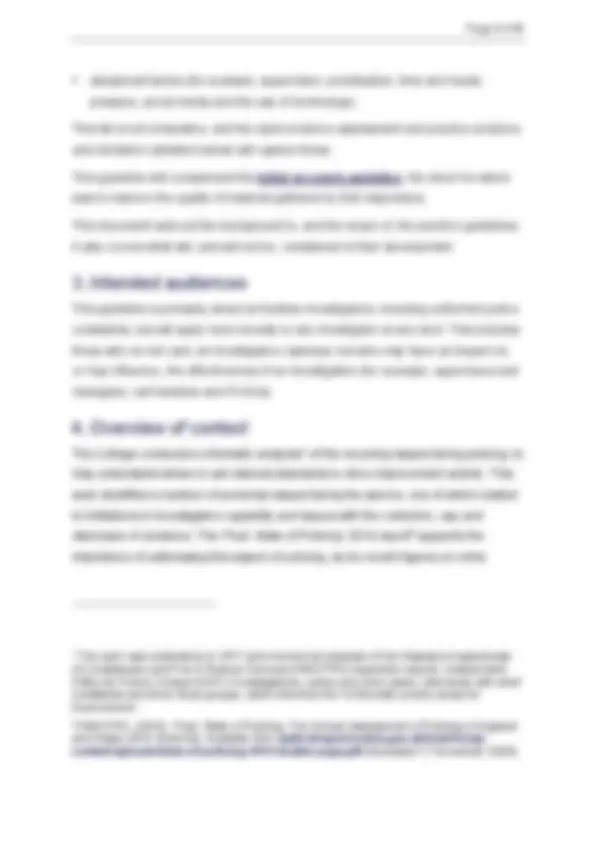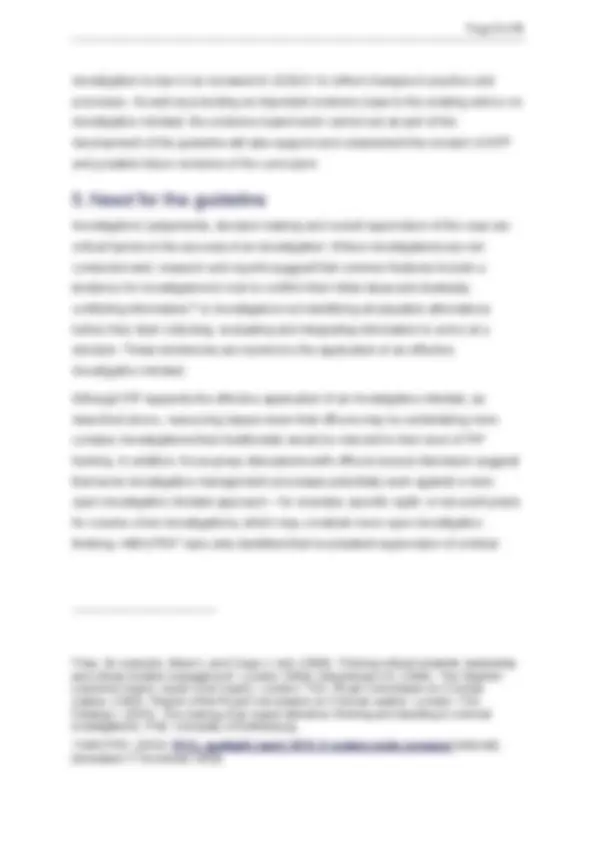






Study with the several resources on Docsity

Earn points by helping other students or get them with a premium plan


Prepare for your exams
Study with the several resources on Docsity

Earn points to download
Earn points by helping other students or get them with a premium plan
Community
Ask the community for help and clear up your study doubts
Discover the best universities in your country according to Docsity users
Free resources
Download our free guides on studying techniques, anxiety management strategies, and thesis advice from Docsity tutors
'Investigative mindset' is a term used to describe a systematic approach to gathering and assessing material, underpinning an effective investigation (see ...
Typology: Study notes
1 / 8

This page cannot be seen from the preview
Don't miss anything!





Scope of practice guidelines
Effective investigations: improving the application of the investigative mindset.
College of Policing practice guidelines are developed and agreed by an independently chaired committee, made up of practitioners, subject matter experts and academics, with support from the College. Practice guidelines are based on evidence. The committee will use empirical research and practitioner experience that has been systematically collected and synthesised to agree the guidelines. These will be subject to consultation with stakeholders, practitioners and the public before being agreed and released by the College.
The overall focus of these guidelines is on how best to ensure the application of an investigative mindset throughout an investigation. ‘Investigative mindset’ is a term used to describe a systematic approach to gathering and assessing material, underpinning an effective investigation (see section 5.3 of ACPO Core Investigative Doctrine (2005:61)). As well as setting out the components that make a good investigative mindset, the guidelines will focus on how to support its effective application, including whether there are any tools or tactics that can be used to mitigate barriers to undertaking a systematic approach. The processes within an investigation cover – but are not limited to – planning, gathering material (organising, examining, collating, recording and evaluating), hypothesis development, testing and interpretation.
The guideline will also support investigative capability among investigators, by exploring factors that can have an impact on the effective application of the investigative mindset. These are varied and may include:
types of bias
working rules (mental shortcuts)
psychological wellbeing, including trauma and tiredness
adversarial culture
outcomes that show a fall in the proportion of crimes resulting in a charge or summons, continuing a downward trend seen since the year ending March 2015.^3 ,^4
The most recent Peel assessment identified force difficulties in meeting the demands of high-volume crime, delays in recovering evidence from digital devices, poor supervision and a shortage of investigators. Although there has been some progress on the latter, with the deficit of accredited investigators decreasing from 19% in May 2018 to 14% in May 2019, most forces still have a high number of vacancies.^5
Within investigation, a number of more specific issues have also been identified, including missed opportunities to collect evidence at the initial scene, missing lines of enquiry, poor-quality case files and a lack of understanding of the court process. College of Policing research on disclosure also suggests that issues with disclosure are underpinned by problems with investigations more generally, including a lack of understanding of reasonable lines of enquiry, a lack of understanding of the independent role of the investigator, and prosecution bias. The low charge rate outlined above also points to a potential lack of experience in investigation and experience in case-file building to increase.
Existing national guidance
The existing national guidance on investigation is found in Authorised Professional Practice (APP) on investigation and in supporting practice advice and guidance.
This guidance provides investigators with a comprehensive framework, within which to plan and conduct any type of investigation.
The Professionalising Investigation Programme (PIP) provides learning and development that is underpinned by the national guidance referred to above. APP on
(^3) Home Office. (2014). Crime Outcomes in England and Wales 2013 to 2014 [internet]. [Accessed 17 November 2020] (^4) Home Office. (2020). Crime Outcomes in England and Wales 2019 to 2020 [internet]. [Accessed 17 November 2020] (^5) HMICFRS. (2019). PEEL spotlight report 2019: A system under pressure [internet]. [Accessed 17 November 2020]
investigation is due to be reviewed in 2020/21 to reflect changes in practice and procedure. As well as providing an important evidence base to the existing advice on investigative mindset, the evidence-based work carried out as part of the development of the guideline will also support and complement the revision of APP and possible future revisions of the curriculum.
Investigators’ judgements, decision-making and overall supervision of the case are critical factors in the success of an investigation. Where investigations are not conducted well, research and reports suggest that common features include a tendency for investigators to look to confirm their initial ideas and downplay conflicting information,^6 or investigators not identifying all plausible alternatives before they start collecting, evaluating and integrating information to arrive at a decision. These tendencies are barriers to the application of an effective investigative mindset.
Although PIP supports the effective application of an investigative mindset, as described above, resourcing issues mean that officers may be undertaking more complex investigations than traditionally would be relevant to their level of PIP training. In addition, focus group discussions with officers around disclosure suggest that some investigative management processes potentially work against a more open investigative mindset approach – for example, specific eight- or ten-point plans for volume crime investigations, which may constrain more open investigative thinking. HMICFRS^7 have also identified that inconsistent supervision of criminal
(^6) See, for example: Alison L and Crego J. eds. (2008). ‘Policing critical incidents: leadership and critical incident management’. London: Willan. Macpherson W. (1999). ‘The Stephen Lawrence Inquiry: report of an inquiry’. London: TSO. Royal Commission on Criminal Justice. (1993). ‘Report of the Royal Commission on Criminal Justice’. London: TSO. Fahsing I. (2016). ‘The making of an expert detective: thinking and deciding in criminal investigations’. PhD. University of Gothenburg. (^7) HMICFRS. (2019). PEEL spotlight report 2019: A system under pressure [internet]. [Accessed 17 November 2020]
identify practical levers to support the implementation of the guideline
This evidence will be gathered both through desk research and through a range of engagement and elicitation activities with policing practitioners and other stakeholders.
About the College
We’re the professional body for the police service in England and Wales.
Working together with everyone in policing, we share the skills and knowledge officers and staff need to prevent crime and keep people safe.
We set the standards in policing to build and preserve public trust and we help those in policing develop the expertise needed to meet the demands of today and prepare for the challenges of the future.
college.police.uk